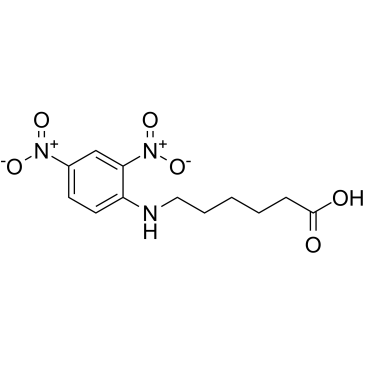N-(2,4-DINITROPHENYL)-6-AMINOHEXANOIC ACID

N-(2,4-DINITROPHENYL)-6-AMINOHEXANOIC ACID structure
|
Common Name | N-(2,4-DINITROPHENYL)-6-AMINOHEXANOIC ACID | ||
|---|---|---|---|---|
| CAS Number | 10466-72-5 | Molecular Weight | 297.26400 | |
| Density | N/A | Boiling Point | N/A | |
| Molecular Formula | C12H15N3O6 | Melting Point | 133 °C | |
| MSDS | Chinese USA | Flash Point | N/A | |
|
Adaptation of Prostatic-Group-Label Homogeneous Immunoassay to reagent-strip format.
Clin. Chem. 27(9) , 1499-504, (1981) The Prostatic-Group-Label Immunoassay (PGLIA) technique has been incorporated into a reagent-strip format. We report use of flavin N6-(N'-2,4-dinitrophenyl-6-aminohexyl)adenine dinucleotide (DNP-FAD) as the prosthetic group derivative and 6-N-(2,4-dinitrophen... |
|
|
Phospholipase A2 stimulation during cell secretion in rat basophilic leukemia cells.
J. Immunol. 136(1) , 259-63, (1986) The bridging of IgE receptors on rat basophilic leukemia cells (RBL-2H3) results in a number of biochemical events that accompany histamine secretion. Prominent among these is the release of arachidonic acid from cellular phospholipids, which could be due to ... |
|
|
Multiple resonance fiber-optic sensor with time division multiplexing for multianalyte detection.
Optics Letters 37(19) , 3969-71, (2012) A proof-of-concept multiwindow fiber-optic sensor utilizing multiple particle plasmon resonance (PPR) of silver nanoparticles and gold nanorods separately on two unclad portions of the fiber for multianalyte detection is demonstrated. The detection is based o... |
|
|
Interaction of purified precipitating and non-precipitating (coprecipitating) antibodies with hapten and with haptenated protein. Evidence of an asymmetric antibody molecule.
Immunology 52(3) , 449-56, (1984) The interaction of monovalent hapten dinitrophenyl epsilon-amino caproic acid (DNP-EACA) with purified IgG1 sheep anti-DNP precipitating and non-precipitating antibodies, and their F(ab')2, F(ab') and Fab fragments, was studied by fluorescence quenching and b... |
|
|
Intramolecular heterogeneity of ligand binding by two IgM antibodies derived from murine hybridomas.
Mol. Immunol. 20(7) , 737-44, (1983) The ligand binding properties of two murine anti-DNP IgM hybridoma antibodies were analyzed. These IgM antibodies, designated NP3-17 C1-20 and SP2/0 I-64 C1-12, each displayed an average of only five high affinity binding sites for the DNP moiety. Reductive 7... |